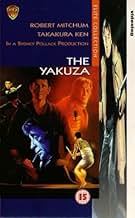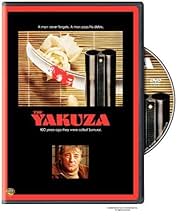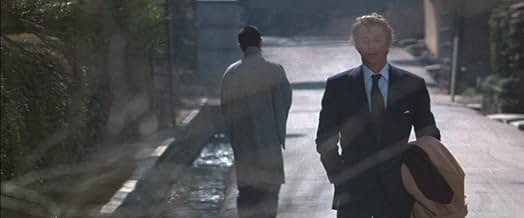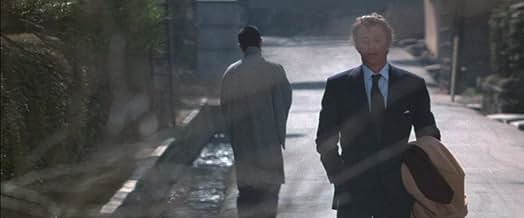CALIFICACIÓN DE IMDb
7.2/10
11 k
TU CALIFICACIÓN
El detective privado estadounidense Harry Kilmer regresa a Japón para rescatar a la hija secuestrada de un amigo de las garras de la Yakuza.El detective privado estadounidense Harry Kilmer regresa a Japón para rescatar a la hija secuestrada de un amigo de las garras de la Yakuza.El detective privado estadounidense Harry Kilmer regresa a Japón para rescatar a la hija secuestrada de un amigo de las garras de la Yakuza.
- Dirección
- Guionistas
- Elenco
Ken Takakura
- Ken Tanaka
- (as Takakura Ken)
Eiji Okada
- Toshiro Tono
- (as Okada Eiji)
Keiko Kishi
- Eiko Tanaka
- (as Kishi Keiko)
Kyôsuke Machida
- Jiro Kato
- (as Kyosuke Machida)
Eiji Gô
- Shiro 'Spider' Tanaka
- (as Go Eiji)
- Dirección
- Guionistas
- Todo el elenco y el equipo
- Producción, taquilla y más en IMDbPro
Opiniones destacadas
Not only is this a good 70's gangster/action flick, it is also one of the few movies about Japan ever produced in the States that does not make too many mistakes about Japanese culture.
Ken Takakura puts in a great performance which is no surprise since he first became famous in Japan for acting in yakuza (gangster) movies.
Anyone who has ever tried to understand or explain the concept of "giri" should see this movie!
Ken Takakura puts in a great performance which is no surprise since he first became famous in Japan for acting in yakuza (gangster) movies.
Anyone who has ever tried to understand or explain the concept of "giri" should see this movie!
A neglected classic of 70s film-making, this is perhaps the most "Japanese" movie ever made by a non-Japanese. The story is rich and multi-layered, featuring not one but two sets of star-crossed lovers in a brilliant and melancholy examination of contrasting themes of memory, secrets and betrayal, friendship, honor and obligation. The script is both literate and intricate; the characters' motives are almost always obscure until another layer of deception is stripped away.
Only Robert Mitchum could have done justice to the role of Harry Kilmer, a retired detective returning to Japan for the first time in many years to rescue his old Army friend Tanner's daughter, who has been kidnapped by the Yakuza in a dispute over a debt Tanner owes them. When Kilmer arrives in Japan, he seeks out Ken, the brother of his ex-lover Eiko (played by the astoundingly lovely and talented Kishi Keiko). Ken is a lone wolf, an ex-Yakuza who now runs a martial arts school, and though there is obviously no love lost between the two, Kilmer knows Ken carries an obligation to him for rescuing Eiko and her infant daughter in the early days of the Occupation.
Kilmer is still bitter about the past, deeply wounded by his love for Eiko, who would not marry him even though she loves him deeply. This was the reason why he left Japan and never meant to return.
Now, with Ken's reluctant help, he rescues Tanner's daughter, but this only leads to an intensifying spiral of tragic consequences, because nothing is quite what it seems. Only when Kilmer begins to understand the truth of the situation is he able to act constructively.
Everyone in this film, from Brian Keith to Herb Edelman to Richard Jordan (in one of his first starring roles) turns in a first-rate performance. James Shigeta and Christina Kobuko also deserve honorable mention. But it is Mitchum and Takakura Ken who make this movie.
This is not an action film in the sense of later -- and far inferior -- efforts like "The Challenge" and "Black Rain", though there are scenes of intense and graphic violence. Nor does it have a happy ending, although some of the characters do ultimately find redemption and a hope of reconciliation.
"The Yakuza" is a work that deserves a much larger audience, one which will totally engage a thoughtful viewer with its universal themes worked out against the background of a very different culture, with its own mindset and traditions. I give it my highest recommendation.
Only Robert Mitchum could have done justice to the role of Harry Kilmer, a retired detective returning to Japan for the first time in many years to rescue his old Army friend Tanner's daughter, who has been kidnapped by the Yakuza in a dispute over a debt Tanner owes them. When Kilmer arrives in Japan, he seeks out Ken, the brother of his ex-lover Eiko (played by the astoundingly lovely and talented Kishi Keiko). Ken is a lone wolf, an ex-Yakuza who now runs a martial arts school, and though there is obviously no love lost between the two, Kilmer knows Ken carries an obligation to him for rescuing Eiko and her infant daughter in the early days of the Occupation.
Kilmer is still bitter about the past, deeply wounded by his love for Eiko, who would not marry him even though she loves him deeply. This was the reason why he left Japan and never meant to return.
Now, with Ken's reluctant help, he rescues Tanner's daughter, but this only leads to an intensifying spiral of tragic consequences, because nothing is quite what it seems. Only when Kilmer begins to understand the truth of the situation is he able to act constructively.
Everyone in this film, from Brian Keith to Herb Edelman to Richard Jordan (in one of his first starring roles) turns in a first-rate performance. James Shigeta and Christina Kobuko also deserve honorable mention. But it is Mitchum and Takakura Ken who make this movie.
This is not an action film in the sense of later -- and far inferior -- efforts like "The Challenge" and "Black Rain", though there are scenes of intense and graphic violence. Nor does it have a happy ending, although some of the characters do ultimately find redemption and a hope of reconciliation.
"The Yakuza" is a work that deserves a much larger audience, one which will totally engage a thoughtful viewer with its universal themes worked out against the background of a very different culture, with its own mindset and traditions. I give it my highest recommendation.
I stumbled across this movie, back when I was in college, on late night television. At the time, I wasn't a Robert Mitchum fan. I always thought Mitchum had a way of sauntering through film roles, not always giving his best. The Yakuza, made when Mitchum was 58 years old, utilizes his style and persona to its maximum potential. He's world-weary, he's been through the mill and he's come out wiser, but not necessarily harder for it.
Written by Paul Schrader and Robert Towne, The Yakuza shows us a different side of the Gangster world than we have been privy to before. This is not a movie of good vs. bad; it's a movie about loyalty and honor to friends and family. We follow Mitchum as Harry Kilmer on a mission to save a friends daughter. For most movies made these days, that premise would be enough, but The Yakuza is deeply layered and far more interesting than that. It turns out that Harry had been in Japan after WWII and had fallen in love with a beautiful woman, Eiko. 30 years later Harry is back in Japan, much has changed, but his feelings haven't.
Harry teams up with Ken Tanaka, Eiko's brother, to find the kidnapped girl. Samurai swords slash and guns blaze, adding intense, well-choreographed action as the plot thickens and Harry realizes that this is no ordinary rescue. We learn a lot about the characters in the movie, from Harry and Eiko to Ken Tanaka and Harry's buddy George, but more than that we learn about Japan and its infamous and historic gangster world. This is a classic movie in every sense of the word and should be viewed as such. And if you're not a fan of Robert Mitchum before seeing this movie, you will be afterwards.
Written by Paul Schrader and Robert Towne, The Yakuza shows us a different side of the Gangster world than we have been privy to before. This is not a movie of good vs. bad; it's a movie about loyalty and honor to friends and family. We follow Mitchum as Harry Kilmer on a mission to save a friends daughter. For most movies made these days, that premise would be enough, but The Yakuza is deeply layered and far more interesting than that. It turns out that Harry had been in Japan after WWII and had fallen in love with a beautiful woman, Eiko. 30 years later Harry is back in Japan, much has changed, but his feelings haven't.
Harry teams up with Ken Tanaka, Eiko's brother, to find the kidnapped girl. Samurai swords slash and guns blaze, adding intense, well-choreographed action as the plot thickens and Harry realizes that this is no ordinary rescue. We learn a lot about the characters in the movie, from Harry and Eiko to Ken Tanaka and Harry's buddy George, but more than that we learn about Japan and its infamous and historic gangster world. This is a classic movie in every sense of the word and should be viewed as such. And if you're not a fan of Robert Mitchum before seeing this movie, you will be afterwards.
I have to agree with the preponderance of viewers here who rate this as a neglected classic of the 70's. All aspects of the film - performances, script, and direction - raise this to the level of greatness. This is certainly among Mitchum's greatest performances - his subdued, world-weary toughness undergirds the movie. The story as has been noted, is a rich and multilayered one with a sadness that aspires to and quite nearly reaches the level of tragedy. It also must be noted that this is one of the most effective portrayals of Japanese culture on celluloid. The movie does not shrink from violence; the various scenes of assassination and slaughter could have been done by Peckinpah. The movie deserves a restoration and should be brought to tv in letterbox mode. (Are you listening, Turner Classic Movies?)
This is just so good I can't believe that not only had I not seen it but not even heard of it. Screenplay by Paul Schrader (and his brother) just before he did Taxi Driver should have drawn attention but then maybe the Scorsese film took all the attention. Sydney Pollack's direction is assured and he gets great performances from everyone, but I reckon it is the script thats the thing. Moreover it is the only US film I have ever seen that seems to have the vaguest notion of Japan and it culture. So much of this rings true that it tingles with the excitement. The 70s streets of Tokyo and Kyoto are something to behold and the believable interaction between the main characters quite fabulous. There is bloody action here but for a film with such a title nothing like as much as expected, and all the better for it. Love, memory, betrayal, loyalty and repayment of debts both financial and emotional are all here - oh and Robert Mitchum and ken Takakura are great.
¿Sabías que…?
- TriviaMartin Scorsese wanted to direct after Calles peligrosas (1973), but the producers wanted Sydney Pollack. Scorsese is on record that he would very much have liked to direct the film and was disappointed that he was passed over. However, he got to direct Alicia ya no vive aquí (1974) instead after being sought out by Ellen Burstyn. "Alice" ended up making more than 20 times its budget and won Burstyn an academy award, while this film became a box office bomb.
- ErroresThe plane that Kilmer is boarding at the end is a Boeing 707; the one shown taking off in the last scene is a 727.
- Versiones alternativasFor the Spanish Castilian version all the dialogues were dubbed to Spanish, even the Japanese lines.
- ConexionesFeatured in ...Promises to Keep (1974)
Selecciones populares
Inicia sesión para calificar y agrega a la lista de videos para obtener recomendaciones personalizadas
- How long is The Yakuza?Con tecnología de Alexa
Detalles
Taquilla
- Presupuesto
- USD 5,000,000 (estimado)
- Tiempo de ejecución
- 1h 52min(112 min)
- Mezcla de sonido
- Relación de aspecto
- 2.39 : 1
Contribuir a esta página
Sugiere una edición o agrega el contenido que falta






























